高中英语 Module 1 British and American English Section 2 Introduction
- 格式:doc
- 大小:52.00 KB
- 文档页数:8
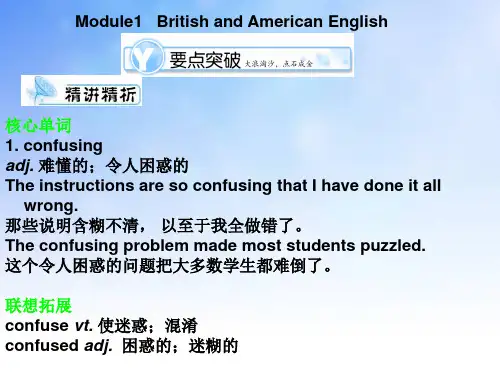
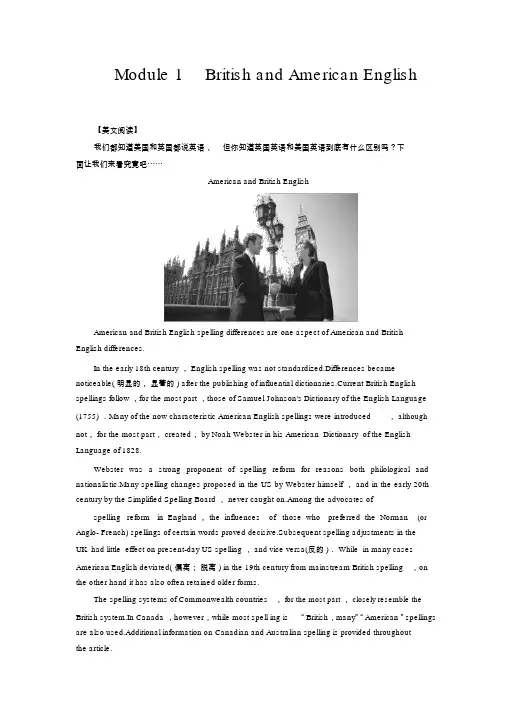
Module 1British and American English【美文阅读】我们都知道美国和英国都说英语,但你知道英国英语和美国英语到底有什么区别吗?下面让我们来看究竟吧⋯⋯American and British EnglishAmerican and British English spelling differences are one aspect of American and British English differences.In the early 18th century , English spelling was not standardized.Differences became noticeable( 明显的,显著的 ) after the publishing of influential dictionaries.Current British English spellings follow ,for the most part ,those of Samuel Johnson's Dictionary of the English Language (1755) .Many of the now characteristic American English spellings were introduced,although not, for the most part, created, by Noah Webster in his American Dictionary of the English Language of 1828.Webster was a strong proponent of spelling reform for reasons both philological and nationalistic.Many spelling changes proposed in the US by Webster himself , and in the early 20th century by the Simplified Spelling Board , never caught on.Among the advocates of spelling reform in England , the influences of those who preferred the Norman(or Anglo- French) spellings of certain words proved decisive.Subsequent spelling adjustments in theUK had little effect on present-day US spelling , and vice versa(反的 ). While in many cases American English deviated( 偏离;脱离 ) in the 19th century from mainstream British spelling,on the other hand it has also often retained older forms.The spelling systems of Commonwealth countries,for the most part,closely resemble the British system.In Canada ,however,while most spell ing is“ British,many” “ American” spellings are also used.Additional information on Canadian and Australian spelling is provided throughoutthe article.【诱思导学】1. What does this passage mainly tell us?【答案】This passage mainly tells us American and British English spelling differences. 2. What influenced current British English spelling?【答案】Samuel Johnson's Dictionary of the English Language (1755) .3. Did later spelling adjustments in the UK have influence on present- day words?【答案】No.Period ⅠPreviewing(教师用书独具)● 课标技能要求初步掌握本课文中的词汇,浅层次理解课文,了解相关的背景知识。
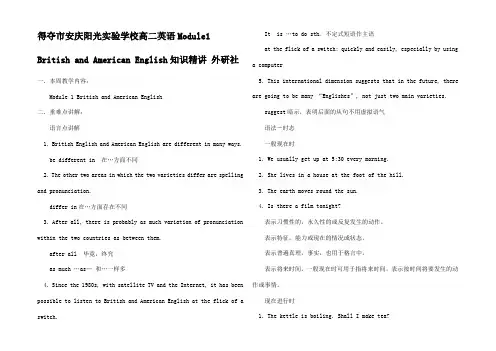
得夺市安庆阳光实验学校高二英语Module1British and American English知识精讲外研社一. 本周教学内容:Module 1 British and American English二. 重难点讲解:语言点讲解1. British English and American English are different in many ways.be different in 在…方面不同2. The other two areas in which the two varieties differ are spelling and pronunciation.differ in在…方面存在不同3. After all, there is probably as much variation of pronunciation within the two countries as between them.after all 毕竟,终究as much …as…和…一样多4. Since the 1980s, with satellite TV and the Internet, it has been possible to listen to British and American English at the flick of a switch.It is …to do sth. 不定式短语作主语at the flick of a switch: quickly and easily, especially by usinga computer5. This international dimension suggests that in the future, there are going to be many “Englishes”, not just two main varieties.suggest暗示,表明后面的从句不用虚拟语气语法-时态一般现在时1. We usually get up at 5:30 every morning.2. She lives in a house at the foot of the hill.3. The earth moves round the sun.4. Is there a film tonight?表示习惯性的,永久性的或反复发生的动作。
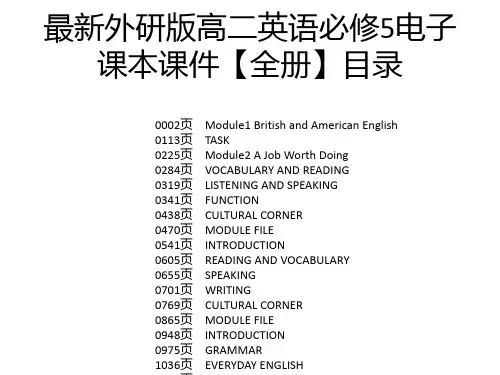
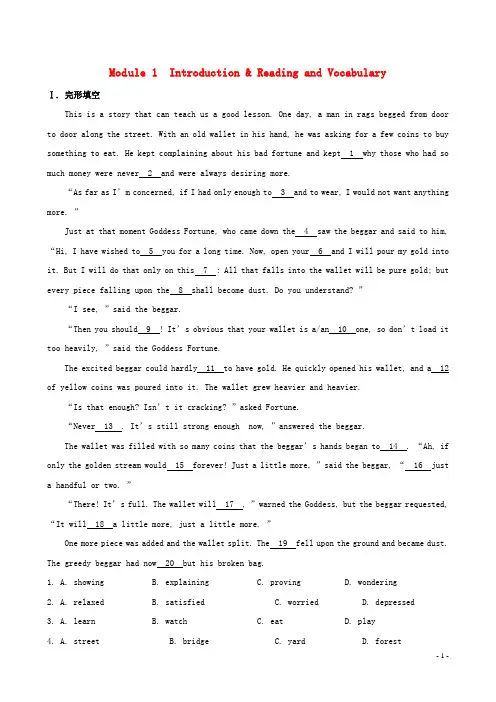
Module 1 Introduction & Reading and VocabularyⅠ. 完形填空This is a story that can teach us a good lesson. One day, a man in rags begged from door to door along the street. With an old wallet in his hand, he was asking for a few coins to buy something to eat. He kept complaining about his bad fortune and kept 1 why those who had so much money were never 2 and were always desiring more.“As far as I’m concerned, if I had only enough to 3 and to wear, I would not want anything more. ”Just at that moment Goddess Fortune, who came down the 4 saw the beggar and said to him, “Hi, I have wished to 5 you for a long time. Now, open your 6 and I will pour my gold into it. But I will do that only on this 7 : All that falls into the wallet will be pure gold; but every piece falling upon the 8 shall become dust. Do you understand? ”“I see, ”said the beggar.“Then you should9 ! It’s obvious that your wallet is a/an10 one, so don’t load it too heavily, ”said the Goddess Fortune.The excited beggar could hardly 11 to have gold. He quickly opened his wallet, and a 12 of yellow coins was poured into it. The wallet grew heavier and heavier.“Is that enough? Isn’t it cracking? ”asked Fortune.“Never13 . It’s still strong enough now, ”answered the beggar.The wallet wa s filled with so many coins that the beggar’s hands began to14 . “Ah, if only the golden stream would 15 forever! Just a little more, ”said the beggar, “16 just a handful or two. ”“There! It’s full. The wallet will17 , ”warned the Goddess, but the begg ar requested, “It will18 a little more, just a little more. ”One more piece was added and the wallet split. The 19 fell upon the ground and became dust. The greedy beggar had now 20 but his broken bag.1. A. showing B. explaining C. proving D. wondering2. A. relaxed B. satisfied C. worried D. depressed3. A. learn B. watch C. eat D. play4. A. street B. bridge C. yard D. forest5. A. praise B. forgive C. help D. comfort6. A. coat B. pocket C. box D. wallet7. A. occasion B. suggestion C. situation D. condition8. A. hand B. feet C. ground D. street9. A. look out B. look after C. look up D. look down10. A. small B. empty C. worn D. full11. A. stand B. wait C. breathe D. think12. A. stream B. piece C. pair D. variety13. A. stop B. request C. fear D. insist14. A. spread B. close C. loose D. shake15. A. pour B. end C. dry D. melt16. A. take B. add C. lend D. send17. A. flow B. burst C. disappear D. change18. A. attract B. permit C. include D. hold19. A. present B. food C. treasure D. metal20. A. nothing B. anything C. everything D. somethingⅡ. 阅读理解ASparrow is a fast-food chain with 200 restaurants. Some years ago,the group to which Sparrow belonged was taken over by another company.Although Sparrow showed no sign of declining, the chain was generallyin an unhealthy state. With more and more fast-food concepts reachingthe market, the Sparrow menu had to struggle for attention. And to make matters worse, its new owner had no plans to give it the funds it required.Sparrow failed to grow for another two years. Until a new CEO, Carl Pearson, decided to build up its market share. He did a survey, which showed that consumers who already used Sparrow restaurants were extremely positive about the chain, while customers of other fast-food chains were unwilling to turn away from them. Sparrow had to develop a new promotional campaign.Pearson faced a battle over the future of the Sparrow brand. The chain’s owner now favored rebranding Sparrow as Marcy’s restaurants. Pearson r esisted, arguing for an advertising campaigndesigned to convince customers that visits to Sparrow restaurants were fun. Such an attempt to establish a positive relationship between a company and the general public was unusual for that time. Pearson strongly believed that numbers were the key to success, rather than custome rs’spending power. Finally, the owner accepted his idea.The campaign itself changed the traditional advertising style of the fast-food industry. The TV ads of Sparrow focused on entertainment and featured original songs performed by a variety of stars. Instead of showing the superiority of a specific product, the intention was to put Sparrow in the hearts of potential customers.Pearson also made other decisions which he believed would contribute to the new Sparrow image. For example, he offered to lower the rent of any restaurants which achieved a certain increase in their turnover(营业额).These efforts paid off, and Sparrow soon became one of the most successful fast-food chains in the regions where it operated.1. Which was one of the problems Sparrow faced before Pearson became CEO?A. The number of its customers was declining.B. Its customers found the food unhealthy.C. It was in need of financial support.D. Most of its restaurants were closed.2. What does the underlined word “them” in Paragraph 2 refer to?A. Customers of Sparrow restaurants.B. Sparrow restaurants.C. Customers of other fast-food chains.D. Other fast-food chains.3. For what purpose did Pearson start the advertising campaign?A. To build a good relationship with the public.B. To stress the unusual tradition of Sparrow.C. To learn about customers’ spending power.D. To meet the challenge from Marcy’s restaurants.4. The TV ads of Sparrow .A. changed people’s views on pop starsB. amused the public with original songsC. focused on the superiority o f its productsD. influenced the eating habits of the audience5. What was Pearson’s achievement as a CEO?A. He managed to pay off Sparrow’s debts.B. He made Sparrow much more competitive.C. He helped Sparrow take over a company.D. He improved the welfare of Sparrow employees.BThe world is changing so fast that English, perhaps the most worldly of languages, is struggling to keep up.Learners in the future are likely to be much younger. Young children are often said to be better at language learning than older learners but they also have special challenges. Young children don’t usually have the kind of instrumental motivation and determination for learning English that older learners often have. English lessons must therefore be fun and rewarding.The reasons why people learn English are also changing. Globalization is bringing together more people than ever who speak different languages and who are turning to English as the means of communication. The English learners of the future may be less worried about sounding exactly like a native speaker and more concerned ab out how to use English effectively in cross-cultural communication. We may be hearing more non-native speakers in dialogues and a wider range of the “New Englishes” now used around the world.Technology will allow English to come to you, rather than you having to go to a special place to learn English.Learning English has always involved both pain and pleasure, private effort and social activity. Traditional learning provided take-it or leave-it mixes of these as well as of content but in future learners will be able to choose a plan which suits their cultural and psychological dispositions(性情), or their particular needs at that moment. They, rather than their teachers, will decide how, what and when they will learn.Above all, learning English is about communication and an important benefit of learning English is being able to exchange views and make friends with people all over the world. Despitethe growing independence of learners, trusted institutions and brand names will remain important.6. Compared to older learners, young English learners .A. are more active in learningB. are more hard-working in learningC. have more difficulties in learningD. have less lasting determination in learning7. What can we learn about the future English language?A. British English will be more popular.B. American English will be more popular.C. Most people will speak standard English.D. Many different kinds of Englishes will appear.8. What can we learn from the passage?A. Future English lessons will be more interesting.B. Old people won’t ha ve to learn English in the future.C. People will pay more attention to English pronunciation.D. Teachers will play a more important role in one’s English learning.9. What can be inferred from the passage?A. Learning English means no pain in the future.B. English training schools will not be popular with young people in the future.C. English learners will become less independent in the future.D. More atten tion will be paid to personal needs in English learning in the future.【拓展题型训练】阅读第二节根据文章内容,从下列A~F选项中选出能概括每一段主题的最佳选项。
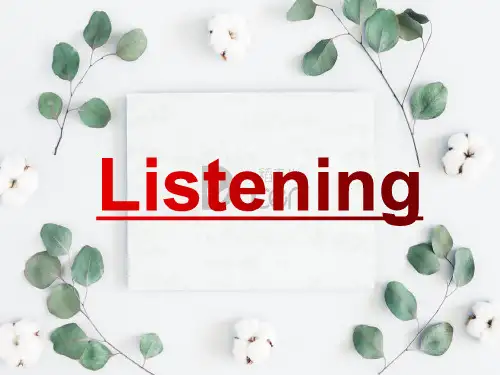
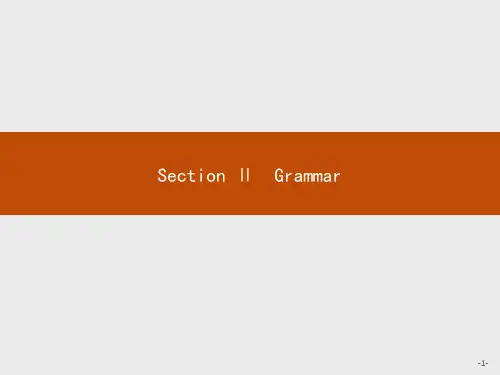
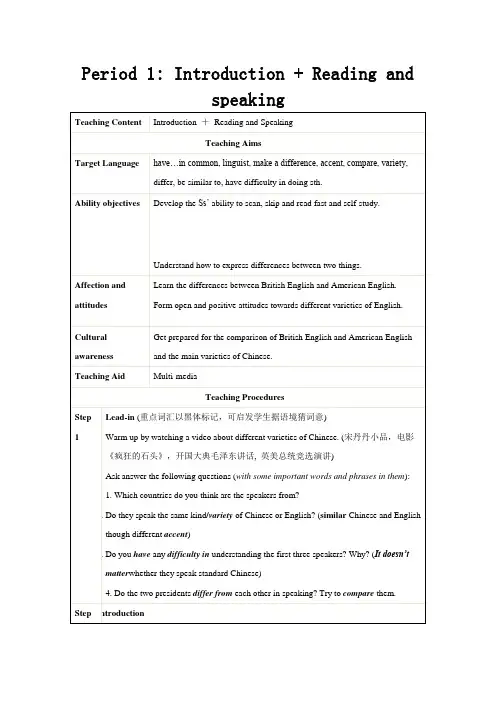
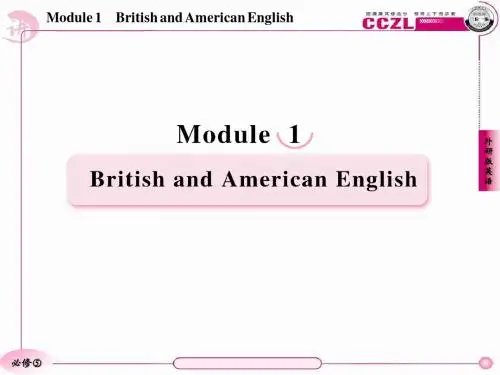
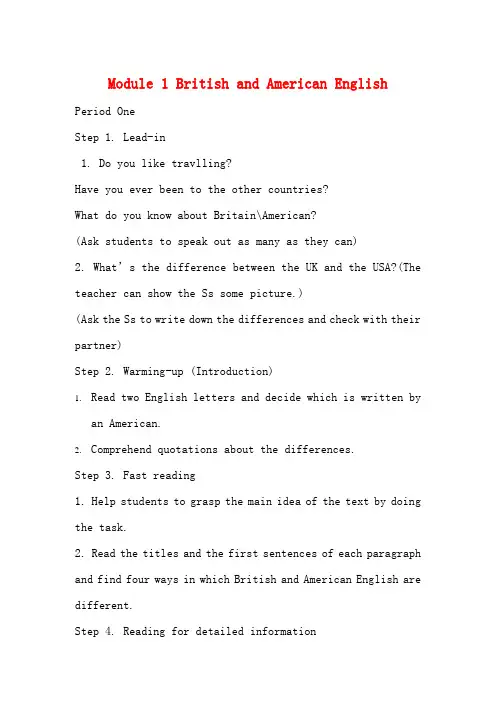
Module 1 British and American English Period OneStep 1. Lead-in1. Do you like travlling?Have you ever been to the other countries?What do you know about Britain\American?(Ask students to speak out as many as they can)2. What’s the difference betwee n the UK and the USA?(The teacher can show the Ss some picture.)(Ask the Ss to write down the differences and check with their partner)Step 2. Warming-up (Introduction)1.Read two English letters and decide which is written byan American.prehend quotations about the differences.Step 3. Fast reading1. Help students to grasp the main idea of the text by doing the task.2. Read the titles and the first sentences of each paragraph and find four ways in which British and American English are different.Step 4. Reading for detailed information1.Read para.1 and fill in the form.(The form is on the nextpage)2.Do some true or false questions and check some detailedinformation(1)There’re a lot of difference in grammar between British and American English.(2) Spelling is the first and most obvious difference between the two.(3) British people say ”write me” and ”on the team”.(4 There’s not much variation in language within the country.(5) Television and Internet have made it easier for the British and Americans to understand each other.(6) In the future, there’ll be only one kind of English.3. Beautiful sentences: to learn some important structures Step 5. Practise1.fill in the blanks with some key wordsThere’re four ways in which British and American Eng lish ________ from each other. The first and most ________ way is in the vocabulary. In grammar there’re a few __________. The British say Have you got…? ______Americans prefer Do you have…? The British use prepositions ______ Americanssometimes ______them. The other two areas in which the two _________ are different are spelling and pronunciation. But for more than a century communications have developed _______.Thanks to satellite TV and the Internet, it has been possible to listen to many Englishmen at the ______ of a switch. So experts believe that the two are moving ______.3. Retell the text according to it.4. DiscussionWhich of the following do you think is the best language in the future? Why?British English, American English, world English, Chinese Step 6. VocabularyTask: Rewrite the sentences using the British words.1. Match the British and American words and phases in the box..2. Ask the students to read their answers out and compare with their partners.3. Rewrite the sentences using British words. .4. Summarize: and Practice:Step 7. Open workTry to find information about Chinese and prepare a report to introduce the following three aspects of Chinese.1.The writing system2.Varieties of Chinese3. Language todayPeriod TwoStep 1. Grammar 1Task 1: Find out the uses of the verbs. Rules of the tenses. Activity 1. Match the sentences with the correct meanings. Activity2. complete the sentences with the correct form of the verbs.Activity3. Tell the uses of the verbs. Rules of the tenses(1)Complete the sentences in your own words.(2)Observe, compare and find out the rules.【NMET.2001】:I ____ ping-pang quite well, but I haven’t had time to play since the new year .A. will playB. have playedC. playedD. play 【北京春招2000】:—You’r e drinking too much.—Only at home. No one ________ me but you.A.is seeingB. had seenC. seesD. sa w2. Can you explain the following use of tenses.•present simple tense•present continuous tense•present perfect tense•future tenseStep 2. FunctionTask: Giving reasonsDirections:1. Underline the words which introduce reasons.2. Answer the questions.3. Complete the sentences with because\since\as or now that. Step 3. TestComplete the messages with the correct form of the verbs. Hi Mum,Hope you__________(be) well. I ________(have) a lovely time in New York. Tomorrow we___________ (go) to see the fireworks. It’s hard to understand the accent here, but it ________(get) easier ,as I _________(be) here for 3 weeks. Next week we _________(fly) to Mexico where they ________(speak) no English at all, just Spanish. I __________(Spend) nearly all the money you gave me!Love , Xiao PingPractice : Make your own sentences creatively, using because, since, as or now that.Step 4. Everyday EnglishTask: Use the phrases freely.1. Remind the students of the expressions that we have learned.2. Ask the students to remember them .3. Speaking practice:Have a conversation using some of the phrases.Step 5. Homework•Have a good revision of today’s lesson and make sentence s with the tenses and various words to express reasons. It’s better to do some related exercises.Period ThreeStep1. Warming up: Talk about the problems exchange students have.•understanding the language•getting on with people•food•different school subjects and timetable•local customs•climateStep 2. PresentationListen to the target language:•Vocabulary and Listening –2.Listening to the 1st part(5m) Listen and complete the passage.•Hello, and welcome to today’s edition of In the air. As you know, every week on this programme we discuss an aspect of the way we _ _1____ now, and today’s topic is the language we ____2____-English. So that’s something which affects us all. The question is,what’s going to _ _3 ___ to the way we speak English in the future? Are we all going to speak like Americans? Or will British English continue to _ 4___? Later on we’re going to _ 5___ you to phone in and _ _6___ your views on the subject, but first we’re going to _ _7___ to two young people, one American, and one British, who have spent time on an educational exchange in the other’s country. We _ _8___ they will have some interesting ideas on the subject.•Play again to answer the quesrions. Make notes if necessary .( Activity 4)•Have the students compare the answer in pairs.•Play the tape a third time for a final check.•Check notes with the teacher.Step 3. Speaking and Writing•1. Review the content of the text by asking some questions.•In how many ways are American English and British English different?•Which is the first and most obvious way?•......2. The great debateWork in groups. Read the notes and decide which is the best variety of language in the future. Give your reasons. British English, American English, World English & Chinese 3. WritingWrite a passage about your favourite choice and the reasons in the discussion above or write three more paragraghs about the Chinese language(activity 4 on P8).Step 4. HomeworkGet more information about the language through the Internet or other method to support your composition. Period FourStep 1. Cultural corner1. Read the text quickly and match each paragragh with the correct main idea.2. Appreciate and analyze 2 or 3 long sentences.Step 2. Module File1. Review: Go over the vocabulary and grammar focus in the module file.2. Put“?” next to the things you are not sure of .Then solvethe problems in groups or raise your questions.3. Do some exercises to consolidate what we learned in this module.Step 3. HomeworkRecite the phrases and sentence patterns .Part One: Teaching DesignPeriod 3: Grammar—Review of verb forms (1)Goals●To review Present simple, present continuous, present perfect and future reference; for and since with present perfectProcedures▇ Reviewing Present simple, present continuous, present perfectActive TensesTHE PASSIVE TENSES■Using the Present Perfect Tense: FOR or SINCE?We use Present Perfect tense to talk about action which started in the past and continues up to the present. ExamplesI have had this computer for about a year.How long have you been at this school?I haven't seen Julia since September.Tip! For other uses of the Present Perfect tense, see the Present Perfect Tense - When To Use.We use for with a period of time, for example: a few days, half an hour, two years. We use since with the time when the action started, for example: last year, June 8, I met you. Each of these present perfect sentences contains a time expression. Each time expression is a length of time (which requires FOR) or a starting time (which requires SINCE).1 Maya has been a professional ________ 1989.2 So far, it has rained ________ five hours.3 I haven't been snowboarding ________ last winter.4 Jo has been a student here ________ March.5 The beaver has been an emblem of Canada ________ many years.6 Cougars have almost disappeared from the Victoria area ________ humans settled here.7 Mary has kept a diary ________ she was ten years old.8 First Nations people in British Columbia have told stories about the eagle ________ hundreds of years.9 The Canadian two-dollar coin (or toonie) has been in circulation ________ 1996.10 They've been married ________ twenty-five years.11 I haven't phoned home______ Christmas.12 We've been here__________ nine o'clock.13 I have worked for International House__________ more thaneight years.14 I haven't visited my home town_________ I left school.15 I haven't been to the cinema__________ ages.16 I have studied non-stop_________ 9.15.17 I have had a driving licence_________I was eighteen.18 She hasn't had a day off _________1999.19 Johan has been in England__________more than two weeks now.20 Peter has been my best friend_________ we were nine.■Closing down by deciding if you need for or since with these time expressions.---for/since last weekend---for/since ten seconds---for/since Christmas Eve---for/since a decade---for/since I finished school---for/since a couple of days---for/since my birthday---for/since a long time---for/since ten centuries---for/since the 70s---for/since I was a boy---for/since August---for/since the last month---for/since fifteen years---for/since ten seconds---for/since Christmas Eve---for/since a decade---for/since I finished school---for/since a couple of days---for/since my birthday---for/since a long time---for/since ten centuries---for/since the 70s---for/since I was a boy---for/since August---for/since the last month---for/since fifteen years---for/since the accident---for/since then---for/since we bought this house ---for/since last month---for/since a millennium---for/since I met you。
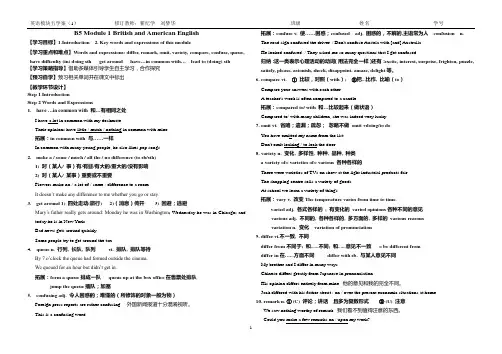
B5 Module 1 British and American English【学习目标】1.Introduction 2. Key words and expressions of this module【学习重点和难点】Words and expressions: differ, remark, omit, variety, compare, confuse, queue, have difficulty (in) doing sth get around have…in common with…lead to (doing) sth【学习策略指导】借助多媒体引导学生自主学习,合作探究【预习自学】预习相关单词并在课文中标出【教学环节设计】Step 1 IntroductionStep 2 Words and Expressions1.have …in common with 和…有相同之处I have a lot in common with my deskmate.Their opinions have little / much / nothing in common with mine.拓展:in common with 与……一样In common with many young people, he also likes pop songs.2.make a / some / much / all the / no difference (to sb/sth)1) 对(某人/ 事)有/有些/有大的/重大的/没有影响2) 对(某人/ 某事)重要或不重要Flowers make no / a lot of / some / difference to a room.It doesn’t make any difference to me whether you go or stay.3.get around 1) 四处走动(旅行) 2)(消息)传开3) 回避;逃避Mary’s father really gets around: Monday he was in Washington; Wednesday he was in Chicago; and today he is in New Y ork.Bad news gets around quickly.Some people try to get around the tax.4. queue n. 行列, 长队, 队列vi. 排队, 排队等待By 7 o’clock the queue had formed outside the cinema.We queued for an hour but didn’t get in.拓展:form a queue排成一队queue up at the box office在售票处排队jump the queue插队;加塞5.confusing adj. 令人困惑的;难懂的(所修饰的对象一般为物)Foreign press reports are rather confusing. 外国新闻报道十分混淆视听。
Module 1 British and American EnglishTEACHING PLANContent:Module 1 British and American English [senior 2,New standard English]Working group:一、题材内容本模块介绍美式英语和英式英语的各方面的确区别,内容紧密结合学生所学语言知识现象,具体讲述二者区别,比较形象直观。
教学中应根据学校、班级、和学生实际情况,灵活掌握教学过程,组织教学内容。
二、教学目标1)语言知识:2)语言技能:3)学习策略4)文化意识:5)情感技巧热爱祖国和珍惜母语并发扬光大.参加各种英语活动,克服困难,锻炼自己用英语交际的能力.为祖国的发展,民族的融合,世界人民的团结贡献自己力量.三、教学重点和难点重点:1.如何使用地道的英语象同学们介绍自己的观点.。
2.正确理解并应用动词的各种时态.。
3.礼貌的进行日常对话。
难点:能用得体的英语介绍汉语的情况。
四、教学方法基于课程改革的理念及“第二语言习得论〞和“整体语言教学〞理论,运用任务型教学途径,围绕核心任务,设定小任务,开展促进自主性学习得课堂活动,强调合作探究与独立思考相结合,初步设计“P—T—P〞自主学习立体模式:pre-task…task-cycle…post-task。
五、教材处理核心任务:学生能通过查阅,杂志等对比;两种英语杂志的区别。
三个环节如下:pre-task:学生查阅资料,上网等,激活背景知识,了解英美风情,引入话题。
task –cycle:通过整个模块的听说读写的训练,强化“描述事物之间区别〞的表达能力,为完成任务做好铺垫post-task〕:达成任务,展示成果,反馈学习情况六、教材安排根据学生学习英语的特点和规律,我们把本模块划分为5课时:Period 1:Introduction & vocabulary & ListeningPeriod 2:Reading and SpeakingPeriod 3:Function and Everyday English &Grammar 1.Period 4:Speaking &WritingPeriod 5:Cultrual Corner &Task &Module File注:教学设计内容较多,应根据学生的学习水平、接受程度及课堂出现的临时状况进行运用、调整及筛选。
1 Module 1 British and American English Section 2 Introduction & Reading-Language points Ⅰ.单句语法填空 1.These stores have nearly as great a________(various) of goods as department stores,but the prices are lower. 答案: variety 2.Tom and David are both my good friends.David seems very serious,________Tom has a good sense of humor. 答案: while 3.Does it make any________(different) whether we have a meeting today or tomorrow? 答案: difference 4.________is obvious that he has finished his work. 答案: It 5.I think________possible to send a letter to someone anywhere in the world without putting a stamp on the envelope. 答案: it 6.Film has a much shorter history,especially when________(compare) to such art forms as music and painting. 答案: compared 7.When Peter speaks in public,he always has trouble________(think) of the right things to say. 答案: thinking 8.The English teacher’s________explanation to the sentence made all his students quite________.(confuse) 答案: confusing;confused 9.We’re going to get________the hutong of Beijing.Would you like to join us? 答案: around 10.Studies have shown long periods of stress can lead________serious health problems. 答案: to Ⅱ.单词拼写 1.________(比较) with many students in the poor areas,we are lucky. 2
答案: Compared 2.Judging from his________ (口音),he is from the city of Jinan. 答案: accent 3.In order to prevent an earthquake,the________(结构) of the buildings must be improved. 答案: structure 4.Since English is spoken all over the world,there are lots of________(种类). 答案: varieties 5.She said she would become a________(语言学家) after her graduation,for she was interested in languages. 答案: linguist 6.He didn’t work hard all the term.________(显然),he can’t pass the final examination. 答案: Obviously 7.All your changes of plan have made me totally________(困惑的). 答案: confused 8.The expert made lots of kind________(评论) about the report. 答案: remarks 9.Please tell us the truth about the accident.Don’t________(省略) anything. 答案: omit 10.Prices are rising________(持续地) in China,which makes people feel worried. 答案: steadily Ⅲ.完成句子 1.It is up to you to decide__________________(你是否去). 答案: whether you go or not 2.He thought he____________________(没有困难) understanding Americans. 答案: had no difficulty in 3.The sea air has____________________(有影响) to his health. 答案: made a difference 4.Wherever he is,he____________________(让这成为习惯) to take part in physical labour. 答案: made it a rule 5.A linguist____________________(旅行) in American to learn more about American 3
English. 答案: got around 6.They ____________________(有很多共同点) in grammar. 答案: had a lot in common 7.In his opinion,people’s accents____________________(不同于) each other. 答案: differ from 8.That ____________________(导致) his making a fool of himself. 答案: led to Ⅳ.完形填空 A few years ago,I had a long way to get home from work. One morning I was on my way home and was very__1__after working 12 hours at night.I __2__ at a restaurant to have __3__.It was really a truck stop and I was the only customer. Right after I placed my order I saw a man come in.He was__4__a small bag.Perhaps he had seen better times,but there was no sign of any__5__times now.He reached in his pocket and __6__some change.He asked the waitress if 38 cents was __7__to buy a cup of coffee.She looked at his hand and said,“Of course.Have a __8__.” (Coffee was 50 cents a cup at the time.) It really__9__ me how she had tried to help him to __10__ his pride and how he had not asked for any charity. Shortly before my food came,I__11__the waitress to come over.I said,“You know,I am not feeling well.I don’t__12__I am going to be able to eat my breakfast.Do you think there is anyone here who might eat it?” She first asked__13__I was OK and then she understood.She said,“I think so.Are you sure?” I told her that I was __14__. She then walked over to the gentleman and told him that I had__15__food and it was too __16__ to stop the order but I didn’t feel like eating.She asked if he would be so__17__as to take it so that they wouldn’t have to __18__it in the dustbin.I walked to__19__the meal,bought a gift card and asked them to __20__it to the gentleman after I left. This man’s quiet dignity (尊严) touched me in ways that I don’t even fully understand. 语篇解读 本文是记叙文。文章讲述了作者被服务员的举动所感动进而帮助别人的故事。 1.A.bored B.excited